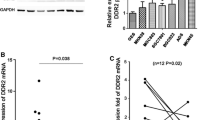Abstract
Introduction
CD151, a transmembrane protein of the tetraspanin family, is implicated in the regulation of cell-substrate adhesion and cell migration. Overexpression of CD151 has been reported in several cancers and controls MET-dependent neoplastic growth by enhancing receptor signaling. However, association of CD151 overexpression with MET or tumor progression has not been reported in gastric cancer.
Materials and Methods
We conducted immunohistochemical analysis of CD151 overexpression in 491 pT3 gastric carcinomas and analyzed the relationship with MET overexpression and prognostic significance.
Results
CD151 was highly expressed in 119 gastric carcinomas (24.2 %) and was significantly associated with higher pN stages. Patients with CD151-positive gastric cancer showed shorter overall (p = 0.003) and disease-free survival (p = 0.001) compared with patients with CD151-negative gastric carcinoma. CD151 overexpression was an independent prognostic factor for overall survival [hazard ration (HR) 1.335; 95 % CI 1.005–1.775; p = 0.046] and disease-free survival (HR 1.903; 95 % CI 1.348–2.685; p < 0.001). Co-overexpression of CD151 and MET was observed in 30 (6.1 %) gastric cancers and was more frequent in advanced pN stages than in other groups. Moreover, co-overexpression of CD151 and MET was a strong independent prognostic factor for overall survival (HR 3.163; 95 % CI 1.958–5.108; p < 0.001) and disease-free survival (HR 3.834; 95 % CI 2.145–6.852; p < 0.001).
Conclusion
CD151 overexpression is an independent prognostic factor and could be a potential molecular therapeutic target in patients with advanced gastric cancers. Further studies are needed to establish the biological significance of CD151/MET co-overexpression and the potential of targeting both molecules as a therapeutic strategy.


Similar content being viewed by others
References
Kamangar F, Dores GM, Anderson WF. Patterns of cancer incidence, mortality, and prevalence across five continents: defining priorities to reduce cancer disparities in different geographic regions of the world. J Clin Oncol. 2006;24:2137–50.
Bang YJ, Van Cutsem E, Feyereislova A, et al. Trastuzumab in combination with chemotherapy versus chemotherapy alone for treatment of HER2-positive advanced gastric or gastro-oesophageal junction cancer (ToGA): a phase 3, open-label, randomised controlled trial. Lancet. 2010;376:687–97.
Huang XY, Ke AW, Shi GM, et al. Overexpression of CD151 as an adverse marker for intrahepatic cholangiocarcinoma patients. Cancer. 2010;116:5440–51.
Yunta M, Lazo PA. Tetraspanin proteins as organisers of membrane microdomains and signalling complexes. Cell Signal. 2003;15:559–64.
Kazarov AR, Yang X, Stipp CS, Sehgal B, Hemler ME. An extracellular site on tetraspanin CD151 determines alpha 3 and alpha 6 integrin-dependent cellular morphology. J Cell Biol. 2002;158:1299–309.
Ke AW, Shi GM, Zhou J, et al. Role of overexpression of CD151 and/or c-Met in predicting prognosis of hepatocellular carcinoma. Hepatology. 2009;49:491–503.
Hemler ME. Tetraspanin proteins mediate cellular penetration, invasion, and fusion events and define a novel type of membrane microdomain. Annu Rev Cell Dev Biol. 2003;19:397–422.
Romanska HM, Berditchevski F. Tetraspanins in human epithelial malignancies. J Pathol. 2011;223:4–14.
Testa JE, Brooks PC, Lin JM, Quigley JP. Eukaryotic expression cloning with an antimetastatic monoclonal antibody identifies a tetraspanin (PETA-3/CD151) as an effector of human tumor cell migration and metastasis. Cancer Res. 1999;59:3812–20.
Tokuhara T, Hasegawa H, Hattori N, et al. Clinical significance of CD151 gene expression in non-small cell lung cancer. Clin Cancer Res. 2001;7:4109–14.
Hashida H, Takabayashi A, Tokuhara T, et al. Clinical significance of transmembrane 4 superfamily in colon cancer. Br J Cancer. 2003;89:158–67.
Zhu GH, Huang C, Qiu ZJ, et al. Expression and prognostic significance of CD151, c-Met, and integrin alpha3/alpha6 in pancreatic ductal adenocarcinoma. Dig Dis Sci. 2011;56:1090–8.
Devbhandari RP, Shi GM, Ke AW, et al. Profiling of the tetraspanin CD151 web and conspiracy of CD151/integrin beta1 complex in the progression of hepatocellular carcinoma. PLoS One. 2011;6:e24901.
Suzuki S, Miyazaki T, Tanaka N, et al. Prognostic significance of CD151 expression in esophageal squamous cell carcinoma with aggressive cell proliferation and invasiveness. Ann Surg Oncol. 2011;18:888–93.
Yoo SH, Lee K, Chae JY, Moon KC. CD151 expression can predict cancer progression in clear cell renal cell carcinoma. Histopathology. 2011;58:191–7.
Voss MA, Gordon N, Maloney S, et al. Tetraspanin CD151 is a novel prognostic marker in poor outcome endometrial cancer. Br J Cancer. 2011;104:1611–8.
Kwon MJ, Park S, Choi JY, et al. Clinical significance of CD151 overexpression in subtypes of invasive breast cancer. Br J Cancer. 2012;106:923–30.
Sadej R, Romanska H, Baldwin G, et al. CD151 regulates tumorigenesis by modulating the communication between tumor cells and endothelium. Mol Cancer Res. 2009;7:787–98.
Franco M, Muratori C, Corso S, et al. The tetraspanin CD151 is required for Met-dependent signaling and tumor cell growth. J Biol Chem. 2010;285:38756–64.
Ke AW, Shi GM, Zhou J, et al. CD151 amplifies signaling by integrin alpha6beta1 to PI3 K and induces the epithelial-mesenchymal transition in HCC cells. Gastroenterology. 2011;140:1629–41.e15.
Klosek SK, Nakashiro K, Hara S, Shintani S, Hasegawa H, Hamakawa H. CD151 forms a functional complex with c-Met in human salivary gland cancer cells. Biochem Biophys Res Commun. 2005;336:408–16.
An JY, Kim KM, Choi MG, Noh JH, Sohn TS, Bae JM, Kim S. Prognostic role of p-mTOR expression in cancer tissues and metastatic lymph nodes in pT2b gastric cancer. Int J Cancer. 2010;126:2904–13.
Hofmann M, Stoss O, Shi D, et al. Assessment of a HER2 scoring system for gastric cancer: results from a validation study. Histopathology. 2008;52:797–805.
Ha SY, Lee J, Kang SY, et al. MET overexpression assessed by new interpretation method predicts gene amplification and poor survival in advanced gastric carcinomas. Mod Pathol. 2013. doi:10.1038/modpathol.2013.108.
Takeda Y, Li Q, Kazarov AR, Epardaud M, Elpek K, Turley SJ, Hemler ME. Diminished metastasis in tetraspanin CD151-knockout mice. Blood. 2011;118:464–72.
Shi GM, Ke AW, Zhou J, et al. CD151 modulates expression of matrix metalloproteinase 9 and promotes neoangiogenesis and progression of hepatocellular carcinoma. Hepatology. 2010;52:183–96.
Acknowledgment
Disclosure
None of the authors have financial relationships relevant to this publication.
Author information
Authors and Affiliations
Corresponding authors
Rights and permissions
About this article
Cite this article
Ha, S.Y., Do, IG., Lee, J. et al. CD151 Overexpression is Associated with Poor Prognosis in Patients with pT3 Gastric Cancer. Ann Surg Oncol 21, 1099–1106 (2014). https://doi.org/10.1245/s10434-013-3339-1
Received:
Published:
Issue Date:
DOI: https://doi.org/10.1245/s10434-013-3339-1




